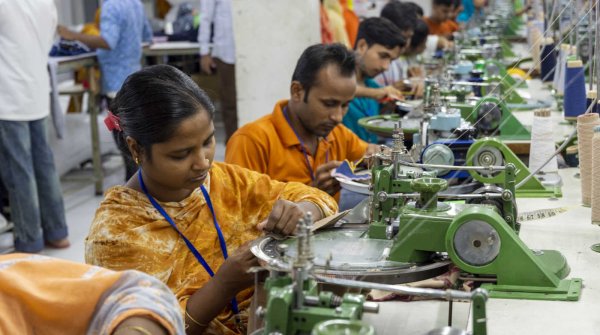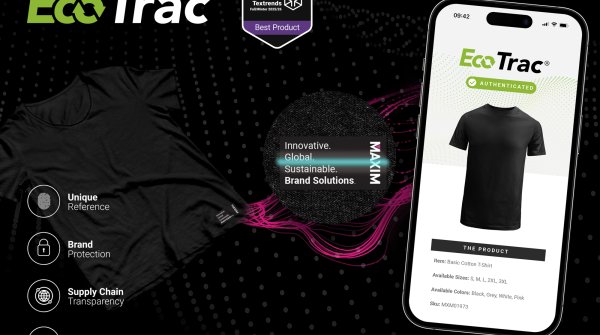
Jill Dumain is CEO of bluesign and has been active in the outdoor industry for 30 years. She has observed many changes in the industry during this time span and has been involved in numerous sustainability initiatives over the years. Sustainability is also the main focus at bluesign. Founded in 2000 in Switzerland, the company has been providing solutions for the textile industry regarding sustainable and environmentally friendly processes. As an independent expert and partner, bluesign provides suggestions for improvement and assessments for every step in the manufacturing process of a textile product.
Against the backdrop of her own professional background and the expertise of her company, Jill Dumain gave an assessment of how the United Nations' Sustainable Development Goals can be interpreted and implemented for the outdoor industry during her keynote at Ispo Munich Online 2021. What is important now for companies that want to align themselves more closely with these goals and act sustainably? Read here.
"Sustainable action is no longer optional, but is now one of the KPIs by which business success is measured," Jill describes the importance of sustainability in today's business context. The UN Sustainable Development Goals aim to provide a framework for reference. In 2015, the United Nations set 17 goals to be achieved together by 2030. These goals are a linguistic and substantive guideline, even if the various goals can be interpreted and understood through different lenses. In her keynote, Jill gives a brief introduction and also raises concerns that the UN goals may well be interpreted differently than on a first reading. Overall, the 17 SDGs include social and humanitarian goals, address environmental pollution, and provide some impetus for environmental protection.

However, with a total of 17 different goals, some companies that have not yet done much in the field of corporate sustainability may wonder where even to start and how to prioritise.
People, planet, partnerships, prosperity and peace - the goals can be roughly summarised by these terms. "If you concentrate on the first three "Ps", the other two may automatically emerge at some point," says Jill Dumain.
Even if it is only these five areas, it is often better to start small and build up rather than trying to tackle everything at once. For example, it can be extremely frustrating for employees who want to get involved in the field if initiatives fail or come to nothing. When a company starts to focus more on sustainability, it is important to think strategically about the core competencies of the company with which it identifies most. You should then start with these and try to initiate sustainability projects here in a targeted manner, especially with regard to day-to-day business. Gradually, links will be found to the other areas of the UN SDGs. Initial projects have a further impact through a rippling effect or additional initiatives can be launched on the basis of core projects.
The outdoor industry, in particular, depends on its customers being able to go outside, play and experience nature. For this reason, sustainability has always mattered more than in other branches of the textile industry. Going back to the five Ps, partnerships are an extremely important component for outdoor manufacturers. Our industry therefore often knows its supply chains and their individual links better than other sectors of the textile and fashion industry, because cooperation between different manufacturers or production stages is often unavoidable. Outdoor companies are often ahead of other industries in terms of sustainable partnerships. However, Jill also emphasises that a lot can be achieved with regard to the UN's SDGs, as long as you have a good understanding of your company's supply chain, involving the different steps and suppliers, as well as working together in partnership. A close look at the supply chain and how individual steps can be made more sustainable together is therefore worthwhile for all of them.
Empowerment and inclusion are also important keywords when it comes to sustainability goals. Achieving these goals requires the support and commitment of the company's own employees. If employees are involved, they often have clever solutions and ideas specifically for their department that work better than those from outside. And even if not all employees are immediately on board when it comes to sustainable changes, it is often a single experience, for example with a supplier or a personally witnessed success on the production side, which is enough to turn rather reserved employees into convinced supporters of sustainable and environmental projects.
Even if you are not the company with the most expertise or the most sustainability projects, you should still communicate and make your efforts known. Jill sums it up this way: "Even if there are only one or two initiatives, it's important to be transparent with civil society, as transparency is becoming an increasingly important factor for consumers." The important thing is to start now, to work with the solutions that are available at the moment, and to continuously evolve, because environmental awareness and sustainable action also grow with time.

 PromotionOpens lens – tools for true impact
PromotionOpens lens – tools for true impact
- Awards
- Mountain sports
- Bike
- Fitness
- Health
- ISPO Munich
- Running
- Brands
- Sustainability
- Olympia
- OutDoor
- Promotion
- Sports Business
- Textrends
- Triathlon
- Water sports
- Winter sports
- eSports
- SportsTech
- OutDoor by ISPO
- Heroes
- Transformation
- Sport Fashion
- Urban Culture
- Challenges of a CEO
- Trade fairs
- Sports
- Find the Balance
- Product reviews
- Newsletter exclusive area
- Magazine



